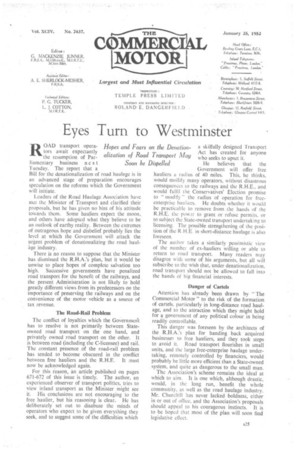Eyes Turn to Westminster
Page 27

If you've noticed an error in this article please click here to report it so we can fix it.
ROAD transport operators await expectantly the resumption of Parliamentary business next Tuesday. The report that a Bill for the denationalization of road haulage is in an advanced stage of preparation encourages speculation on the reforms which the Government will initiate.
Leaders of the Road Haulage Association have met the Minister of Transport and clarified their proposals, but he has given no hint of his attitude towards them. Some hauliers expect the moon, and others have adopted what they believe to be an outlook of earthy reality. Between the extremes of outrageous hope and disbelief probably lies the level at which the Government will attack the urgent problem of denationalizing the road haulage industry.
There is no reason to suppose that the Minister has dismissed the R.H.A.'s plan, but it would be unwise to place hopes of complete salvation too high. Successive governments have penalized road transport for the benefit of the railways, and the present Administration is not likely to hold greatly different views from its predecessors on the importance of preserving the railways and on the convenience of the motor vehicle as a source of tax revenue.
The Road-Rail Problem The conflict of loyalties which the Governmen't has to resolve is not primarily between Stateowned road transport on the one hand, and privately owned road transport on the other. It is between road (including the C-licensee) and rail. The constant presence of the road-rail problem has tended to become obscured in the conflict between free hauliers and the R.H.E. It must now be acknowledged again.
For this reason, an article published on pages 671-672 of this issue is timely. The author, an experienced observer of transport politics, tries to view inland transport as the Minister might see it. His conclusions are not encouraging to the free haulier, but his reasoning is clear. He has deliberately set out to disabuse the minds of operators who expect to be given everything they seek, and to suggest some of the difficulties which a skilfully designed Transport Act has created for anyone who seeks to upset it.
He believes that the Government will offer free hauliers a radius of 40 miles. This, he thinks, would mollify many operators, without disastrous consequences to the railways and the R.H.E., and would fulfil the Conservatives' Election promise to " modify " the radius of operation for freeenterprise hauliers. He doubts whether it would be practicable to remove from, the hands of the R.H.E. the pow:.r to grant or refuse permits. or to subject the State-owned transport undertaking to licensing. The possible strengthening of the position of the R.H.E. in short-distance haulage is also foreseen.
The author takes a similarly pessimistic view of the number of ex-hauliers willing or able to return to road transport. Many readers may disagree with some of his arguments, but all will subscribe to the wish that, under denationalization, road transport should not be allowed to fall into the hands of big financial interests.
Danger of Cartels Attention has already been drawn by "The Commercial Motor" to the risk of the formation of cartels, particularly in long-distance road haulage, and to the attraction which they might hold for a government of any political colour in being readily controllable.
This danger was foreseen by the architects of the R.H.A.'s plan for handing back acquired businesses to free hauliers, and they took steps to avoid it. Road transport flourishes in small units, and the large free-enterprise haulage undertaking, remotely controlled by financiers, would probably be little more efficient than a State-owned system, and quite as dangerous to the small man.
The Association's scheme remains the ideal at which to aim. It is one which, although drastic, would, in the long run, benefit the whole community, as well as the road haulage industry. Mr. Churchill has never lacked boldness, either in or out of office, and the Association's proposals should appeal to his courageous instincts. It is to be hoped that most of the plan will soon find legislative effect.




















































































